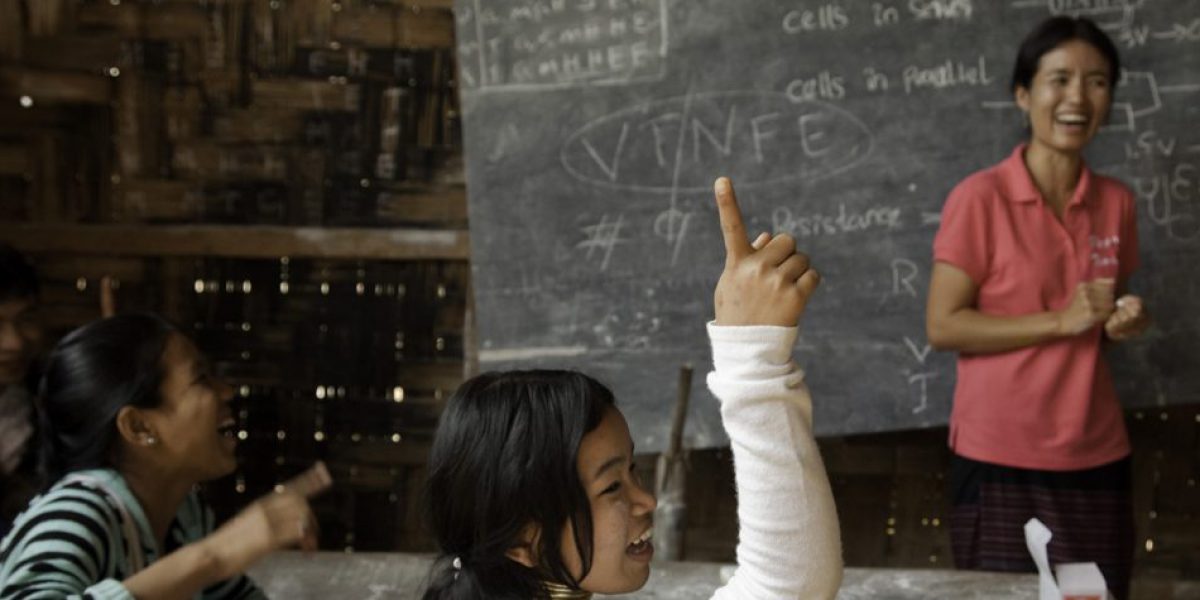Thailand: funding shortfall leads to education gaps
28 August 2012|Sermsiri Ingavanija and Dana MacLean

Mae Hong Son, 28 August 2012— A funding pitfall in education for the Burmese refugees along the Thai border may negatively affect their preparedness to go home.
The focus of the international donor community is shifting from the camps towards Burma, and a lack of sufficient resources has forced many organisations working in the camps, such as JRS, to make cutbacks to critical programmes like schooling.
“It will be difficult for young people [to return to Burma] if they don’t have an education”, said Lee Reh* a Karenni student who has lived in to the camp since 2001. JRS hopes that support for education can be bolstered so that the school programmes, and students, do not suffer.
Inside Burma, the Peace Donor Support Group, including the government of UK, Norway, Australia, EU, UN and World Bank, have offered a net total reaching nearly $500 million US to support peace building. Meanwhile, in the camps in Thailand, up to 25 per cent of funding for essential services may be cut, according to Burma Campaign UK (BCUK), a London-based advocacy and research organisation.
The refugee community fears that it may lead to higher student dropout rates, premature return and less preparation for a durable solution. JRS partners with the Karenni Education Department (KnED) to implement education programs in two Mae Hong Son camps where the majority of the refugee population hails from eastern Burma’s Kayah state. However, JRS has been unable to attain the full amount – roughly US $800,000, or 24 million baht – needed to maintain the programmes in 2012.
“We feel sad because of budget cuts”, said Khu Oo Reh, a refugee education official. Other sectors affected by funding shortages include support for basic humanitarian needs, such as food provision. Rations have been cut down to only 1,640 kcal per day per person – 22 percent less than the recommended 2,100 kcal required to meet international standards, according to the World Food Programme.
The risks of return
An estimated 160,000 refugees remain in the camps, fearful that the decline in assistance will inevitably force them to return before the country is safe.
“The government is trying to show the world the image that the country is changing into a democracy. It’s not true. There are still murders and tortures, as well as rape cases, uncleared landmines and [other forms of] violence”, Sha Reh, another student, told JRS.
While a number of ceasefire agreements have been signed in the last year, based on past experiences, this is no guarantee of peace. In January 2012 the Karen National Union (KNU) signed an agreement with the Burma government but renewed fighting broke out in the east only a few days later.
Similarly, in the northern Shan State, the rebel group, the Shan State Army was fired upon little over a week after signing a peace agreement at the end of January. The Burma military also refused to withdraw troops from agreed upon areas, according to local news sources. In addition, eastern and western areas are rife with landmines. Roughly five million people in ten out of Burma’s 14 states and regions are exposed to landmine contamination, according to Geneva Call, an international mine ban advocacy organisation. This poses serious challenges for repatriation.
“If repatriation does happen, the government will have to be ready to provide for people’s welfare, such as housing, security, education, food, healthcare and safety assurance”, Sha Reh added.
Education as preparation
JRS education programmes in Mae Hong Son and Khun Yuam districts, ongoing since 1997, aim to prepare refugees for durable solutions. JRS provides basic education, teacher training, special education, school materials, vocational training and non-formal education to 5,200 students in Ban Mai Nai Soi and Ban Mae Surin from primary to secondary school.
“Education is very important for our people. We need many skills because we’re poor. Many people are illiterate”, said Than Maung, a refugee teacher. JRS education and vocational training provide refugees with skills that will enable them to find good jobs later on, according to Than Maung.
Similarly, in May, Aung San Suu Kyi spoke at the World Economic Forum in Bangkok and emphasised the importance of education that would allow young people to reach their potential.
“What I’m afraid of is not so much joblessness as hopelessness”, she said.
In the camps, where people are trapped without freedom of movement, education provides hope for the future. Cutting back on assistance may push refugees back to Burma despite ongoing fighting and the risk of landmine contamination.
“Education is really important for the students”, said Khu Oo Reh.
Without the legal right to leave the camps to find other schools or jobs, the funding shortages leave the refugees to face a difficult path ahead.
“If there is no support for education, where will the students go to school?” Naw Kreh, a refugee education official asked. Refugees cannot adequately prepare for return if funding for education dries up, according to the Karenni refugee students.
“Only education can provide for a nation. Darkness cannot drive out darkness”, Naw Kreh added.
To donate to JRS Thailand programmes, please click here.
*Names have been changed to protect identity


